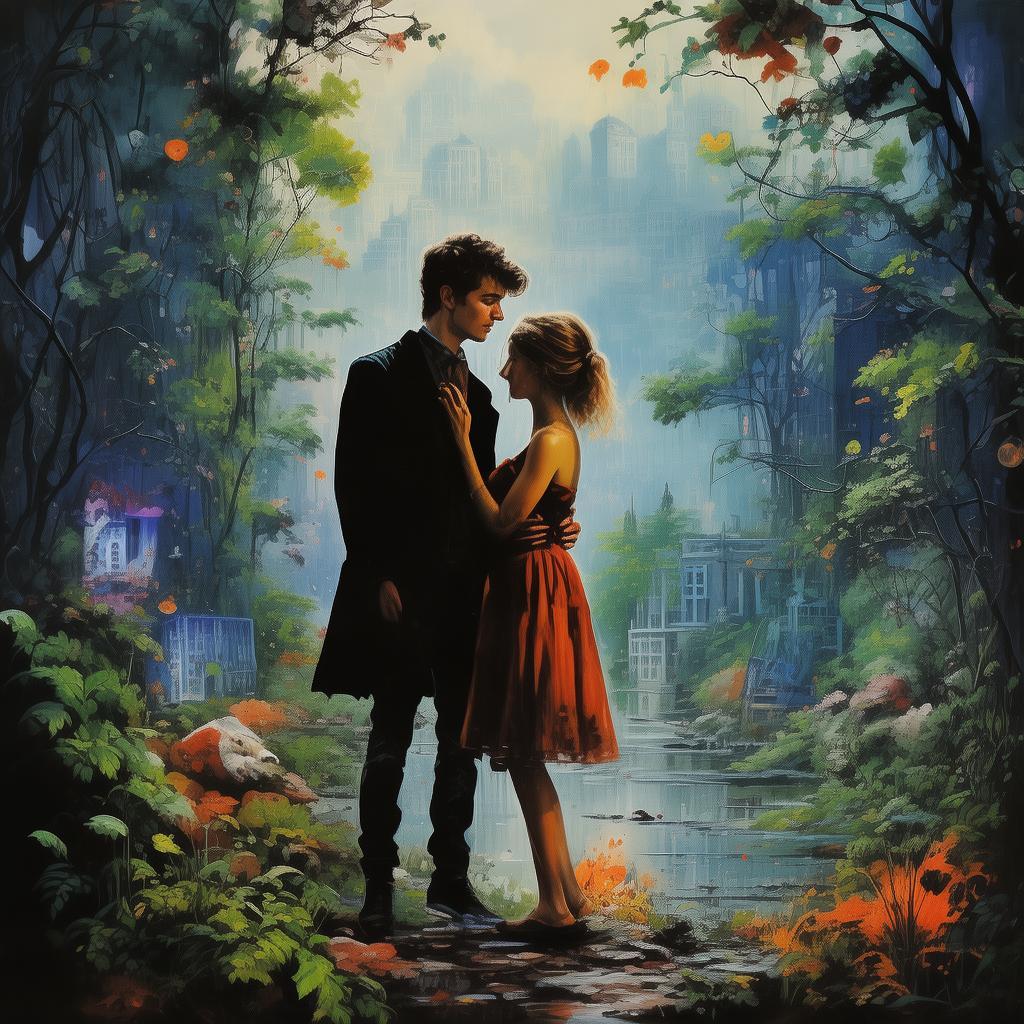The Lute of the Silk Road
In the heart of the ancient Silk Road, where caravans of spices, silks, and tales crossed the desert to and from the East and West, there was a city that echoed with the melodies of distant lands. The city was Samarkand, and among its many wonders stood the grand bazaar, a marketplace where the world's riches and secrets were traded. It was in this bustling bazaar that two souls were to intertwine their destinies—a young, talented musician named Lao Li, and a merchant's daughter named Yujing.
Lao Li was a maestro of the lute, a stringed instrument that could mimic the voice of the wind, the laughter of children, and the whispers of the desert. He roamed the Silk Road, his lute as his only companion, his music as his only wealth. Yujing, with her eyes as deep as the desert and hair like the silk of Samarkand, was the daughter of a prosperous merchant who had built his fortune on the back of the bustling trade route.
Their love was as unexpected as the desert rain. One evening, as the sun dipped below the horizon and the stars began to twinkle, Lao Li played a serenade beneath Yujing's window. His lute sang of love and longing, and the sound of it made Yujing's heart flutter. She knew then that this was the man she would love, and she felt the same.

But love was not the only story woven into the fabric of the Silk Road. Betrayal and greed were the threads that could unravel the most beautiful tapestries. One night, as Yujing's father was away on a business trip, a rival merchant, greedy for Yujing's father's wealth, plotted to kill him. Lao Li, who had been eavesdropping on the plot, found himself in a predicament. He knew he could save Yujing's father's life, but he also knew that his actions would place him in the merchant's crosshairs.
Lao Li made the difficult decision to save Yujing's father. He alerted the guards, and the plot was thwarted. However, the merchant, vengeful and cunning, learned of Lao Li's role in the matter. He confronted Lao Li, a man of few words and fewer defenses, and in a fit of rage, he struck the young musician down.
As Lao Li lay injured on the ground, his lute lying beside him, his world seemed to fall apart. But his love for Yujing was a fire that burned even through the darkness. He vowed to rise from his injury and prove his worth, not only as a musician but as a man who would not let love's flame be extinguished by the winds of betrayal.
Months passed, and Lao Li's determination paid off. He healed, and with each passing day, he honed his lute-playing skills, turning his pain into music that spoke of sorrow, resilience, and love. The Silk Road, which had once been a place of wonder and joy, now became a place of redemption and hope.
When Yujing's father returned from his trip, he found his daughter in tears, her lute lying broken at her feet. He learned of the betrayal and the bravery of the young musician who had saved his life. He searched for Lao Li, and when he found him, he was moved by the young man's resilience and the beauty of his music.
Yujing's father offered Lao Li a place in his home, and Lao Li, with his lute in hand, accepted. He and Yujing were married in a ceremony that was as beautiful as the music that had brought them together. The lute was the centerpiece of their wedding, and Lao Li played a serenade that filled the room with love and hope.
But the story of the Silk Road's heartstrings was not yet complete. The merchant who had tried to kill Yujing's father was not one to let a grudge go so easily. He had bided his time and now returned, armed with a vengeful heart and a plan to destroy Lao Li and Yujing's newfound happiness.
The day of the wedding, as the sun rose over the Silk Road, the merchant's men appeared. They attacked the wedding party, and chaos ensued. Lao Li, with his lute as his weapon, fought back with the ferocity of a man who had nothing left to lose. Yujing's father, a man of action and valor, joined the fight, and together, they fought off the attackers.
In the end, the merchant was captured, his plans for revenge thwarted. Lao Li's lute played a final serenade, a song of victory, of love that had withstood the test of time and the treacherous winds of the Silk Road. The music of the lute was a testament to the resilience of the human spirit, to love that could conquer all.
The Lute of the Silk Road was a tale of love, betrayal, and redemption, a story that would be told for generations, a melody that would echo through the desert sands and the bustling bazaars of Samarkand, a reminder that even in the darkest of times, love's light could shine through.
✨ Original Statement ✨
All articles published on this website (including but not limited to text, images, videos, and other content) are original or authorized for reposting and are protected by relevant laws. Without the explicit written permission of this website, no individual or organization may copy, modify, repost, or use the content for commercial purposes.
If you need to quote or cooperate, please contact this site for authorization. We reserve the right to pursue legal responsibility for any unauthorized use.
Hereby declared.









